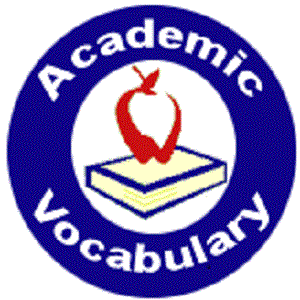Academic Vocabulary

The ACHIEVE THE CORE website is an excellent resource for everything related to literacy instruction. I recently became aware of a free, online tool on their site called the Academic Word Finder.
When teachers enter sample text into the tool, it finds the high-value, academic vocabulary words in that text. The Common Core emphasizes the need for students to learn academic vocabulary in order to access the content of subject-area texts, as noted in the anchor Language Standard #6 for grades K-12:
“Acquire and use accurately a range of general academic and domain-specific words and phrases sufficient for reading, writing, speaking, and listening at the college and career readiness level.”
What is academic vocabulary? As noted in my training book for The Key Vocabulary Routine professional development, academic vocabulary is referred to as academic English, or the language of schooling. Academic vocabulary facilitates communication and thinking about disciplinary (i.e., subject-area) information and is needed to convey abstract and technical ideas that do not come up in social or casual conversation. Academic vocabulary includes more words derived from Latin and Greek that tend to be longer due to prefixes and suffixes.
Academic vocabulary can be organized into two categories (Beaumann et al, 2012, Nagy & Townsend, 2012):
- General academic words:
- high-frequency words that appear regularly in written text across multiple subjects, but are not frequently used in conversational language
- typically have different meanings depending on the subject in which they are used
- best taught in authentic contexts in multiple subjects so students can learn the different uses of the word
- Examples: distribute, identify, major, network, range, regulate, valid
- Subject-specific (also called domain-specific) academic words:
- Words that are unique and essential to learning individual academic subjects
- Typically have just one meaning
- Best taught in a single subject, authentic context
- Examples: polynomial, cytoplasm, federalism
There are many more words that students may be unfamiliar with than teachers have time to teach. Therefore, it is important for teachers to choose carefully the academic vocabulary they will teach in-depth, and these words should come from text that is being used in the content classroom. What’s nice about the ACHIEVE THE CORE Academic Word Finder, is that it alerts teachers to the presence of academic vocabulary in the text they use. In the end, it is the teacher who must decide which words to teach, and the tool is not intended to replace teacher judgment about those words. But it is a useful support!
Resource: IELTS Poscast – Vocabulary and Lexical Resource
References:
Beaumann, Manyak, BLachowicz, Graves, Arner, Bates, Cieply, Davis, Peterson, & Olejnik (2012). A multi-faceted, comprehensive vocabulary instruction program. Vocabulogic blog post, October 21, 2012.
Nagy, W.E., & Townsend, D. (2012). Words as tools: Learning academic vocabulary as language acquisition. Reading Research Quarterly, 47(1).

 Joan Sedita is the founder of Keys to Literacy and author of the Keys to Literacy professional development programs. She is an experienced educator, nationally recognized speaker and teacher trainer. She has worked for over 35 years in the literacy education field and has presented to thousands of teachers and related professionals at schools, colleges, clinics, and professional conferences.
Joan Sedita is the founder of Keys to Literacy and author of the Keys to Literacy professional development programs. She is an experienced educator, nationally recognized speaker and teacher trainer. She has worked for over 35 years in the literacy education field and has presented to thousands of teachers and related professionals at schools, colleges, clinics, and professional conferences.
Leave a Reply